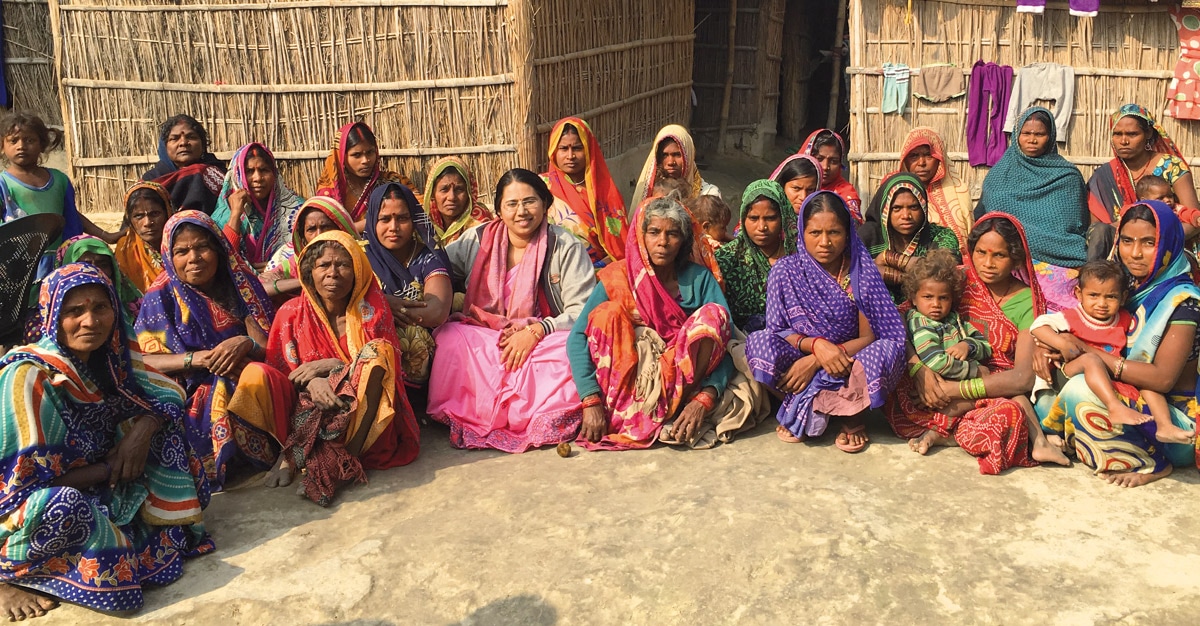|
Small groups of Dalit women are ensuring shelter, education and safety for their communities by raising their voices in Bihar State, India.
In and around Patna Children on the Edge support two small, dynamic organisations who are fighting against caste discrimination for the children in their communities. They do this through a combination of education and local action, with a major strand of this action being rooted in the creation of Women’s Groups. In the rural villages surrounding Patna, our partner Parivartan Kendra (PK) support 10 community women’s groups. Their key strategy in bringing change in these communities is the strengthening and development of these groups, each of which has around 25 women who work closely with their area’s education centre in trying to help the community, including its children, realise their rights. One of the key priorities of the women’s groups is ensuring that their children are given access to education so that they can break out of the poverty cycle and the trap of bonded labour. Their aim is to slowly create a groundswell of awareness regarding rights, which then leads to action and the realisation of those rights. Varsha Jawalgekar is the leader of this organisation, she says ‘I believe the only way real change can be brought in Dalit communities is through collective action, through the gathering and the rising up of many’. The community have witnessed how an individual fighting alone for their rights, is not only timely and ineffective, but dangerous. Varsha herself has been jailed and beaten, but more disturbingly an 8 year old girl was was badly beaten by a landowner simply for telling him she was going to school. He mocked her with caste names and asked her if she would be a magistrate or police officer when she grew up. When she said ‘why not?’ he attacked her with an axe. She is still experiencing medical problems as a result, and her parents are fighting for her case in the courts. Varsha believes that communities as a whole must be taught about their rights and supported to stand up together, safely and peacefully fighting for change. This is not just a theory; the women’s groups are already bringing change. Under Indian law, Dalits living below the poverty line are just as entitled as the rest of the population to certain allowances for housing, food and free health care. In practice though, Dalits face corruption and discrimination regarding these entitlements. They also experience practical difficulties in applying for them as many are illiterate and lack the required identification papers. One group in the Chakfeteh area has been running for eight years and is well established. They recently ensured that 19 households received housing entitlements (financial allowance for housing). They did this through training on their basic legal rights and entitlements and being supported to complete the paperwork. Another example of change was brought by the women’s group is in Madhaul. Dalit children at the community school here were experiencing high levels of violence and discrimination. Being treated as ‘untouchable’ is outlawed, but teachers here were making them sit separately, physically abusing them and denying them access to lessons and school meals. Varsha and the women’s group here conducted a peaceful protest in front of the school. As a result they were locked up in a classroom by the headmaster, who made threats about ‘boiling them alive’. Varsha called the police, who freed them and demanded the headmaster apologise. Although this seems like a a lenient consequence, it sent a strong message throughout the community about the practice of discrimination based upon caste. The women’s group have since reported positive changes in the school’s treatment of their children, as a direct result of their actions. A few years ago in Patna, two Dalit children were kidnapped from a poor area with a high crime rate. Many Dalit children are abducted here with no reprisals due to local corruption, so Varsha and some of her colleagues sat in the middle of the road until a traffic jam built up in order to get a proper response from the authorities. When the police arrived they said that the children could be brought back to the women within the hour. This is not only clear evidence that the police are involved in trafficking, but that Varsha’s model of standing up collectively against discrimination, does yield results. Change here is gradual and hard won. Through an outlawed yet active caste system, Dalit children here face severe discrimination, violence and poverty. They go un-noticed locally due to cultural norms and are overlooked internationally because of India’s relative wealth. Children on the Edge are committed to supporting our partners in bringing lasting change for these children and their communities. Support usComments are closed.
|
RECEIVE OUR EMAILSBlog Categories
All
Archives
July 2024
|
|
JOIN US ON SOCIAL MEDIA
|
Annual Report | Contact Us | Jobs | Media Centre | Resources | Shop
Accessibility & Policies: Accessibility | Equity, Diversity & Inclusion Policy | Complaints| Privacy Policy | Safeguarding
Accessibility & Policies: Accessibility | Equity, Diversity & Inclusion Policy | Complaints| Privacy Policy | Safeguarding
Children on the Edge, 5 The Victoria, 25 St Pancras, Chichester, West Sussex, PO19 7LT, UK | 01243 538530 | [email protected]



 Give monthly
Give monthly Fundraise for us
Fundraise for us RSS Feed
RSS Feed
